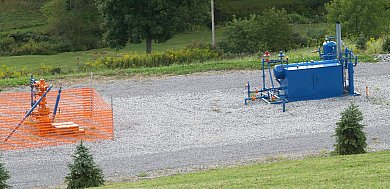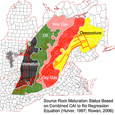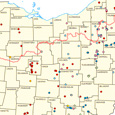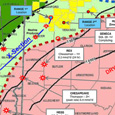Marcellus Shale gas leasing: Consult your lawyer, and get it in writing
Sunday, September 19, 2010

SALEM, Ohio — Marcellus Shale well drilling is an economic boom many are counting on. Some landowners ran toward the prospect of getting a new mineral rights lease, while others lagged behind, trying to figure out what it all means, both financially and environmentally.
In western Pa., drilling has already commenced in just about every county from the southern border to the New York state line, and permits have been issued in Beaver and Butler counties. Ohio won’t be far behind.
While a landman from a gas drilling company may approach landowners with a deal that appears to be good to be true (and it may be), there are many factors to consider before moving forward.
Some landowners report discontent after signing the leases, while others don’t appear to give it a second thought.
However, one Pennsylvania attorney gives this general advice to anyone considering signing a lease with a gas drilling company: Take your time and consult with an attorney.
Atty. Dale A. Tice, of Marshall, Parker & Associates, with offices in four Pa. cities, said landowners need to protect themselves and that needs to be done with the aid of an attorney.
First, be sure you understand the lease that has been proposed for your property.
Landowners should not just sign the oil and gas lease presented by the company landman, Tice said. Everything in the lease is negotiable, and the starting point for landowners will be to review the proposed lease with an experienced oil and gas attorney.
If the gas company begins drilling operations on the leased premises during the primary term of the lease, the lease will be extended as long as gas is produced in paying quantities, which could be a very long time. This means that many landowners will have only one chance to get their lease negotiations done right.
Ben Funderburg, vice president of land at Ohio Valley Energy, an oil and gas company based in Youngstown, also points out some items landowners might want to consider.
Size of your tract
If your parcel is equal to or smaller than those around you, the company approaching you might not necessarily need your particular lot to amass the total land area it needs for an exploration project.
But if your parcel is larger, it may be a key piece in the geologic puzzle, and thus command a higher price. If you do not already know the relative sizes of the parcels around you, that information is easy to find out through your county government.
Keep in mind, especially if you have a large piece of property, that an oil and gas developer may not necessarily want your property for drilling — yet. It may just be amassing land for seismic evaluation needed to precisely measure its geologic opportunity.
Location
Your parcel is more valuable if it’s in proximity to pipelines, main roads or existing production. These logistical advantages reduce the cost for getting oil and gas from your property to market.
If you’re in an area that is near a large transmission pipeline, your land is more valuable than a parcel that is not.
Competition
The oil and gas representative approaching you might not necessarily be the only one interested in your land.
In areas known to contain rich deposits, there are often multiple drillers competing to secure leases. As with any other product or service, higher demand means higher prices.
To find out how competitive the market may be in your area, check with your neighbors to see who may have approached them. Check with your local county recorder’s office to see if any drilling companies have already recorded leases in your area.
Geology. In areas where proven reserves are already developed, prices being paid to nearby landowners could serve as a logical guide.
But make sure you’re comparing geological apples to apples. Wells planned for shallower areas, like the proven and heavily developed Clinton formation, may not be as lucrative as those envisioned for deeper shales that are unproven, yet highly promising.
One thing to remember is that an agreement by your neighbors on a certain price per acre doesn’t mean you have to accept such a price. In fact, if any oil and gas company presents you with a “non-negotiable price,” you should be suspicious. All leases are negotiable.
Best advice
Tice reminds all landowners to get an attorney’s advice before signing any agreement with any gas leasing company.
(Next week in Part II: Water considerations.)




